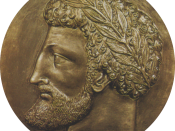Livy intends to write an extensive piece of work about Rome's entire history, and so decides to express his opinions about this history and how it relates to modern times. Most historical writers from the period concerned did in fact provide a preface to their work, and the themes deployed in such prefaces had degenerated into rhetorical commonplaces, which were intended to depict the work as seeming worthy of the reader's attention. Although Livy shares arguments from other authors there are certain innovations, which tell us more about his intentions.
In his preface Livy states that the best benefit of history is "that you contemplate instructive instances of every kind as though displayed upon a conspicuous memorial, to choose from them, for your own good and that of your country, what to imitate, and also what other things, shameful in their origin and shameful in their result, to avoid." This evidence is to be found in "what their life was, and what their customs were, through what men, and by what means, dominion was secured and extended."
Livy draws our attention particularly to the steady decline into depravity of this magnificent race and its principles during the Republic. In other words Livy is trying to write these books so that they may serve as examples for his readers and teach them how to conduct their lives. It is clear that his preoccupations are overwhelmingly moral. Examples were very important in ancient Rome, from models of admired authors that schoolboys copied out and imitated to the examples from Roman history cited by their elders as they argued the best course of action to take in the senate, before the people, or in the courtroom and halls of declamation.
In Livy's eyes people were not born with virtue already implanted into their characters, but they acquired it as they lived their lives. Virtuous behaviour is the product of environment and education. The first Romans were from the dregs of society. For them to acquire a sense of community and patriotism, of lawful behaviour and mutual tolerance, required a long period of nurture and development. They had to be taught, and sometimes compelled by threats or force, into behaving correctly. Therefore Livy puts emphasis on Romulus as lawgiver (1.8) and Numa as the teacher of religion (1.21). He also mentions Ancus Marcius as the builder of Rome's first prison, built to "meet this unhappy state of affairs and to discourage the further growth of lawlessness" (1.33). Livy puts so much emphasis on the Roman people as a whole, indicating that they are the real heroes of the narrative. He continually puts emphasis on their lowly beginnings to make the fact that they overcame their humble beginnings and eventually succeeded as brilliantly as they did, all the more incredible and remarkable. Due to their high principles and courage they produced "the mightiest empire the world has known - next to God's" (1.4). And to make the Roman people seem even more gifted and blessed Livy often introduces stories which mix the divine and human aspect, to make it seem that the gods favoured Rome.
In his preface Livy states that history can improve people's lives when it is written properly, both in their public and private lifestyles, and at the same time he laments the sorry state of contemporary morality, in which "we can endure neither our vices nor their cure." It seems that Livy is trying to tell us, although he doesn't mention it, that history is the cure to these "vices" and that it's one of the remedia. And in this endeavour Livy struck a sympathetic chord. Men just wanted a return to the simplicity of earlier times and a return to the glorious times and principles and qualities that Rome was based on. They were tired of war and decline and the depravity of modern times. The following attributes are principles of religious, political and private activity. And in writing most of what is mentioned above, Livy achieves another one of his aims. He states that he was seeking another reward from this toil, that of "distracting myself from the contemplation of the miseries which our age has witnessed over so many years - so long at least as I am recalling those ancient days in my thoughts, free from every care such as could render the mind of a writer anxious, even if it could not divert it from the truth." Livy is basically trying to teach the Romans of his time how to behave properly and there is a strong didactic element throughout his writing. The contemporary depravity has partly driven him to write these histories. Livy is a product of his time. He has been brought up in an age when Rome wasn't as magnificent and wonderful as it was before and so he is trying to block out the present and look back into the past. Livy is looking to escape from the present and is trying to encourage moral improvement in the Roman people who read his books. He seeks to depict the desperate condition to which the Romans have come, and to demonstrate by referring to the past his ideas of how their pre-eminence must be retained, and how the past Roman virtues, such as pietas, fides, concordia, disciplina, prudentia, ratio, clementia, pudicitia, virtus, dignitas, gravitas and frugalitas could be gained again. It is clear from the preface in Ab Urbe Condita that Livy had strong moral convictions about the moral decadence surrounding him, and felt the need for a spiritual and moral improvement, but that he didn't feel that this problem could be solved immediately.
Livy is constantly drawing our attention to the religious aspects of Rome's history and stressing the importance of religion frequently; whether people are rushing to shrines whenever there is a crisis or a commander is dedicating a temple to a god or goddess after he has attained victory. Livy felt that pietas towards the gods and fides towards men were closely interconnected, and thus felt the need to include many religious connections in his books about the right relationship between the gods and men and he even included unimportant events, which involved religion in his books. He thought that public morality could be improved by introducing a secure social value of religion. He believed that men should fear the gods and pay homage to them whenever possible because this would help them become morally stronger and serve as a weapon for the people who were at that time inexperienced and unsophisticated. Hence, he refers to the fact that Rome was divinely chosen, "sed debebatur, ut opinor, fatis tantae origo urbis maximique secundum deorum opes imperii principium." He also puts emphasis on Numa's institution of religious rites, "lest the citizens' minds should grow degenerate in leisure." Livy believed that by searching through the mass of superstitious myths he would find a central doctrine of the relationship between gods and men, which would lend order and importance to human life, as well as ensure the right ordering of their lives.
Livy contrasts this religious emphasis with his own patriotism. He has no hesitation in stating that the Romans were superior to all other races in the moral qualities on which greatness depends. He believed that the Romans of his time were nothing compared to his ancestors, and the reward he is looking for from writing about the history of Rome is a cure for the despondency induced by thinking about the present. Livy's patriotism leads him to depict Romans as possessing all the qualities that result in greatness. However, he isn't exclusively patriotic because he praises other non-Romans who display worthy ideals and criticises those Romans who don't. He is using both moral and patriotic ideas to teach his readers that greatness can't be achieved if one doesn't possess the virtues which lead to a healthy and moral society.
As well as all the other morals and principles, Livy seeks to emphasise the importance of pudicitia. He does this by referring to the story of Lucretia's rape and suicide near the end of Book 1. It serves as an example of how important chastity was for the well-being of society. It also serves as an example of how not to behave. The lustful Sextus Tarquinius is obviously representing the morally corrupt side of things in this episode whereas Lucretia is representing the good side with her "tenacious chastity". Livy is trying to teach us that people who do wrong will get what they deserve sooner or later, although it may end in tragedy for people who act justly.
Livy uses all these examples to contrast the extremely decadent society in which he lives with the prestigious society in which his morally superior ancestors lived. They possessed all the qualities that Livy deemed worthy of the world's most magnificent race, and in describing each success and failure of his ancestors he would usually attribute these to some moral quality or flaw they had. The morals and principles of his ancestors are seen to be desirable not only because they would benefit the society in which he lives, but because it's part of a coherent and integrated philosophical outlook. For society to be able to improve, virtues must be praised and vices condemned.





